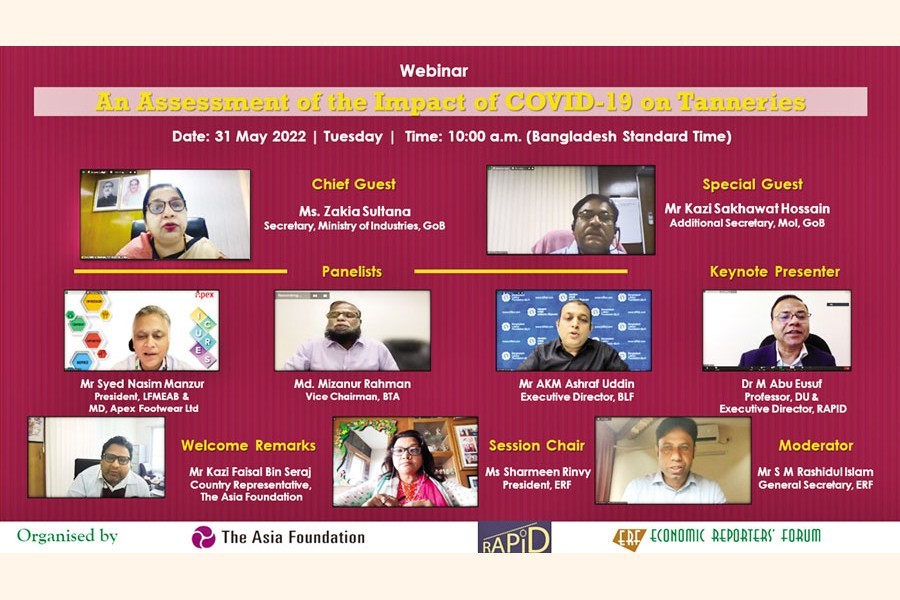Speakers at a programme on Tuesday suggested replicating RMG model in the country's leather sector, decreasing import tax on its required chemicals, and providing long-term policy support to develop the industry further for global market.
The industry owners should focus on making their factories complaint with the Leather Working Group (LWG) standards to increase export of footwear and other leather goods, they added.
They also urged the authorities concerned to effectively manage solid waste produced at the BSCIC Tannery Industrial Estate in Hemayetpur, Savar as well as to make the central effluent treatment plant (CETP) there functional as soon as possible.
The suggestions came in a webinar, tilted "An Assessment of the Impact of Covid-19 on Tanneries". The Asia Foundation (TAF), Research and Policy Integration for Development (RAPID) and Economic Reporters' Forum (ERF) jointly organised it.
Secretary of Ministry of Industries (MoI) Zakia Sultana spoke as the chief guest. MoI Additional Secretary Kazi Sakhawat Hossain spoke as the special guest with ERF President Sharmeen Rinvy in chair.
Leathergoods and Footwear Manufacturers and Exporters Association of Bangladesh (LFMEAB) President Syed Nasim Manzur, Bangladesh Tanners Association (BTA) Vice President Mizanur Rahman, and Bangladesh Labour Foundation (BLF) Executive Director A K M Ashraf Uddin spoke as discussants in the webinar.
Moderated by ERF General Secretary S M Rashidul Islam, TAF Country Representative Kazi Faisal Bin Seraj delivered the welcome remarks, while RAPID Executive Director Dr Abu Eusuf presented the keynote paper.
In the presentation, titled "Covid-19 Impacts on Tanneries: Charting Recovery in the Post-Pandemic World", Dr Eusuf said non-compliance in the country's leather sector is the biggest bottleneck towards raising its export.
Due to non-compliance issues, the export-oriented leather product makers cannot source raw materials from local tanneries, losing the scope of massive value addition.
The leather sector needs specific and time-bound implementation programmes to complement the Leather and Leather Goods Development Policy 2019 as well as to recover from the pandemic impacts, he further said.
Tax on imported chemicals and other raw materials must be decreased to help the tanneries survive during this tough time.
Policy continuation needs to be ensured (for the sector) for at least three to five years, and the policies should be similar to those of the RMG industry.
Besides, the tanneries in the estate should be permitted to register their plots with soft terms and conditions. The Department of Environment must provide the 'environmental clearance certificate' to the tanneries, based on performance, as soon as possible, he added.
Meanwhile, Syed Nasim Manzur, also the Managing Director of Apex Footwear Ltd, said the discussion of value addition has become more relevant - given the circumstances of significantly stressed global supply chain - following the COVID-19 pandemic and the Russia-Ukraine war.
"If we could utilise local raw materials, it would be a huge competitive advantage for us. But unfortunately, we're unable to use the advantage for some known reasons."
Leather and leathergoods sector is one of the prioritised sectors in the world that can generate huge employment in a short time, as such examples are there in Korea, Vietnam and China, he mentioned.
The LFMEAB president noted that from 1972 to 2019, leather export has decreased by 79 per cent, while in the same period, export of finished products increased by 80 per cent. It means that the country is going towards value addition, but sadly not with local raw materials.
He requested the MoI secretary to follow up with the National Board of Revenue (NBR) and the Ministry of Finance to lift the 'red zone restriction' imposed on Hazaribag, so that the tanners can sell their properties - either to pay bank loans or to make new investments.
In terms of making the CETP functional, Mr Manzur said a French company - SUEZ Water Technologies and Solutions - wants to retrofit and repair the plant as per the LWG standard.
The company, active in 190 countries in the world, has already contacted the MoI via the Bangladesh Small and Cottage Industries Corporation (BSCIC) to get five particular information regarding the CETP, he added.
The MoI secretary said, "If we can't make the CETP in the tannery estate functional, it will be hard for the companies there to get the LWG certification."
"We talked with an Italian company for management of the huge solid waste - produced everyday in the estate. But the talks didn't go far. Currently, the ministry is discussing the matter with an Indian company."
Ms Sultana also informed that 200 more acres of land - adjacent to the tannery estate - are on the process of acquiring, where the CETP-2 would be built to handle the current situation.
Meanwhile, the MoI additional secretary said the leather factories need to be fully complaint to get the LWG certificate, and the CETP functionality is in the core to do that.
On preserving rawhides, he mentioned that the government has taken some measures to make raw salt available across the country in the upcoming Eid-ul-Azha.
The BLF executive director suggested resolving labour issues in the tanneries to get international standard, as over 70 per cent of the tanneries are non-unionised.
During the pandemic, some of the companies in the sector went for layoff due to shutdown of factories and decreased demand of leather goods. "When the lockdown was lifted, those companies recalled their respective workers and gave back their jobs, but on temporary basis," he added.
The BTA vice chairman said Bangladesh has surpassed the export targets for leather and leather goods in the current fiscal, 2021-22, by 18 per cent.
But price hike of chemicals in global market and rise in shipping cost have become major barriers for the sector's export development. Besides, preservation of rawhides has also become dearer against the backdrop of salt price increase and higher taxes on chemical import.
He also urged the government to ease terms of bank loans in the upcoming Eid-ul-Azha to ensure smooth collection of rawhides.


